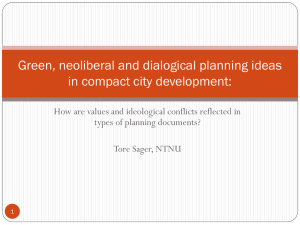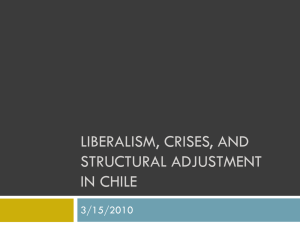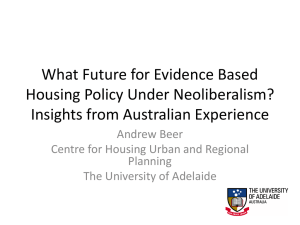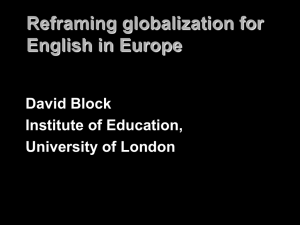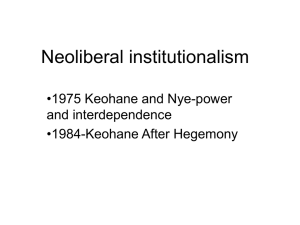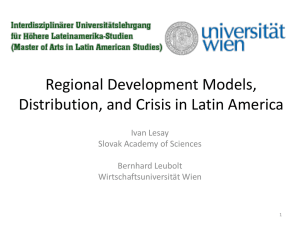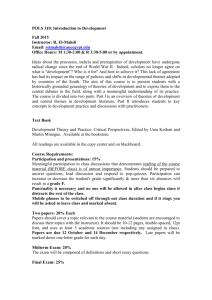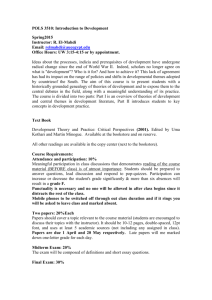Urban Salon, December 3, 2010 Professionalism, volunteerism, and
advertisement
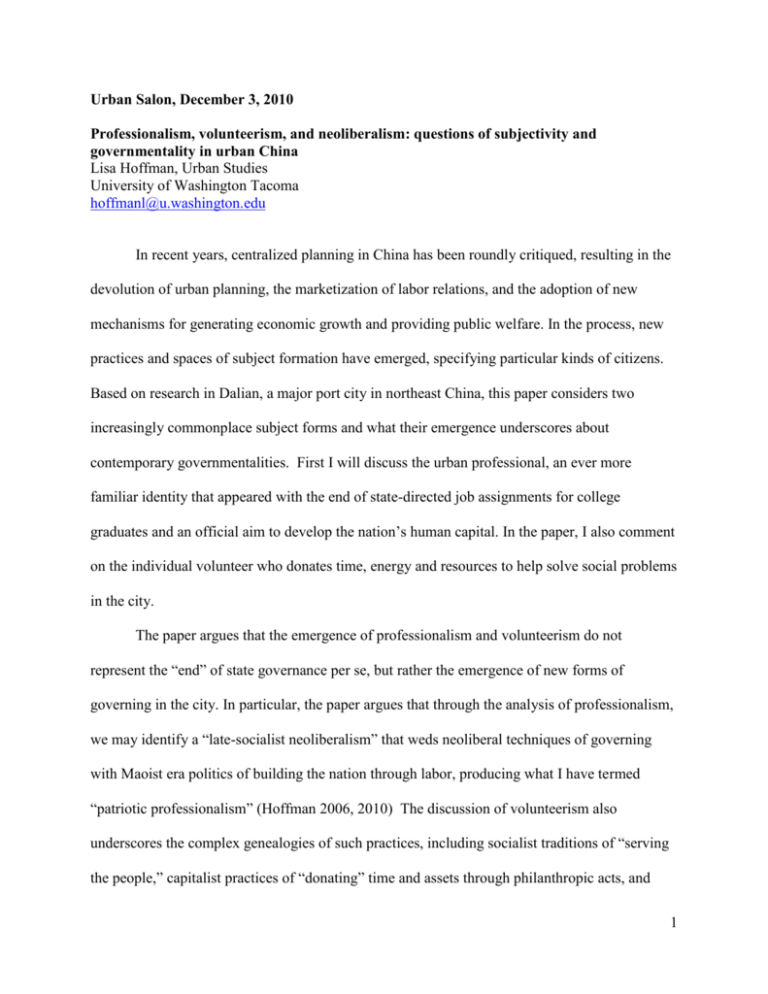
Urban Salon, December 3, 2010 Professionalism, volunteerism, and neoliberalism: questions of subjectivity and governmentality in urban China Lisa Hoffman, Urban Studies University of Washington Tacoma hoffmanl@u.washington.edu In recent years, centralized planning in China has been roundly critiqued, resulting in the devolution of urban planning, the marketization of labor relations, and the adoption of new mechanisms for generating economic growth and providing public welfare. In the process, new practices and spaces of subject formation have emerged, specifying particular kinds of citizens. Based on research in Dalian, a major port city in northeast China, this paper considers two increasingly commonplace subject forms and what their emergence underscores about contemporary governmentalities. First I will discuss the urban professional, an ever more familiar identity that appeared with the end of state-directed job assignments for college graduates and an official aim to develop the nation’s human capital. In the paper, I also comment on the individual volunteer who donates time, energy and resources to help solve social problems in the city. The paper argues that the emergence of professionalism and volunteerism do not represent the “end” of state governance per se, but rather the emergence of new forms of governing in the city. In particular, the paper argues that through the analysis of professionalism, we may identify a “late-socialist neoliberalism” that weds neoliberal techniques of governing with Maoist era politics of building the nation through labor, producing what I have termed “patriotic professionalism” (Hoffman 2006, 2010) The discussion of volunteerism also underscores the complex genealogies of such practices, including socialist traditions of “serving the people,” capitalist practices of “donating” time and assets through philanthropic acts, and 1 neoliberal practices of shifting responsibilities to individuals and other community groups. This analysis of professionalism and volunteerism thus also affords us the opportunity to ask how we may make sense of neoliberalism in contemporary modes of governing the city. Thus, I am interested in considering what it means to talk about neoliberalism in China. As an anthropologist I encountered this issue through a focus on new subject forms. In many studies you will hear about “neoliberal subjects” emerging at particular times and with particular kinds of reforms in the way governing occurs. More specifically, many critiques of neoconservative political programs have been said to be ushering in an era of “neoliberal subjectivity.” I hesitate to have “neoliberal” modify subject, however, for it assumes so much about the relationship between political programs and subjectivity, and it tends to reify much more fluid social forms. In addition, I have spent a great deal of time thinking about the different components that are a part of governmental regimes and rationalities – such as practices, techniques, norms, politics, ethics and modes of self care – and how they come together in different ways at different moments. It was this analytical stance that has forced me to consider how practices from disparate, and seemingly contradictory, political traditions might converge. This in turn ultimately led me to the argument in my book about the unexpected wedding of neoliberal techniques of governing with socialist political norms and traditions in patriotic professionalism, and it has led me to a new set of questions about volunteerism and charitable giving as modes of solving social problems in the city. This view of neoliberalism is not simply about adding an “s” to neoliberalism, for the term often is used to describe a singular and hegemonic political project that is governed by markets and class interests; rather, I am asking us to consider a different conceptualization of neoliberalism that allows for the possibility of not knowing the political and ethical outcomes in advance. 2 In this presentation I begin with a brief description of the professional subject and then I explain how my approach – informed by Foucault’s work – has led me to a particular study of neoliberalism. I am especially interested in understanding how mechanisms of governing that reference the liberal tradition and contain rationalities that are similar to other advanced liberal regimes are in fact combined with non-liberal practices, norms, and politics. A consequence of my approach also converges with a growing literature on the “uses of neoliberalism,” as James Ferguson (2009) has recently put it. This is a stance that does not assume we know the political or social forms that emerge simply because the market mechanism is involved or because we identify a reference to liberalism. To be clear, I am not trying to depoliticize that which should be critiqued as producing inequality or marginalization, but I also believe these are research questions rather than theoretical stories to tell or polemical arguments to make. Empowerment, justice, belonging – this is exactly what is at stake. A story about a young professional As an anthropologist, I would like to begin with a story about a man, Mr. Song, who had been an active Red Guard leader during the Cultural Revolution (1966-1976). He met his wife as a Red Guard, she also was a leader, and as he tells his tale, had devoted his life to building the socialist nation. Mr. Song was trying to explain to me what the difference was between his generation and his children’s generation. He worked hard to understand what they wanted and how they went about things, but found it very difficult. As he elaborated his ideas over dinner one evening, his daughter sat quietly at the table. It was only later that she confided that they often fought over these issues and that he was using my presence to send a message to her. 3 One thing Mr. Song said was that his daughter’s generation “liked a lot more adventure and risk” and that they had “less sense of responsibility to the government for training them.” Here he was referring specifically to his experience of state-sponsorship for college training, meaning college was free for students, but that they were obligated to work for the state after graduation. Not only that, but when Mr. Song graduated from school he entered his workplace through the direct state job assignment system. In this system, universities reported the numbers of graduates and fields of study to the province. The provincial level authorities reported this information to the central level, and national level planning groups took the numbers and requests from work units to make assignment decisions. Plans were then sent back down to the local level for implementation by the universities and local governments. It was effective in placing needed personnel in far away places and along with the dossier (dangan) and household registration system (hukou) enabled the government to use geographic distribution as a form of social control and even punishment. A key governmental objective of the system was full employment, and education’s purpose was to fulfill central production plans. Under this system, labor was not a resource to be developed individually, but rather was part of the state-owned means of production and socialist welfare package of the work unit (see Bian 1994, Davis 1990). The returns on one’s labor power were not for individual accumulation, but “were realized only in the state’s production…not on the individuals” (Cheng 1998: 23). Job assignments, in other words, were expressions of national duty and socialist nation building; work for Mr. Song was not about self-focused development, in contrast to his daughter’s cohort. He had been taught that, as Liu Shaoqi said “It is the worthiest and most just thing in the world to sacrifice oneself for the Party, for the proletariat, for the emancipation of the nation and of all mankind, for social progress and for the highest interests of the overwhelming majority of the 4 people” (cited in Bray 2005: 60, emphasis added). By the mid-1990s, however, there was a decided shift away from the allocation of “undifferentiated labor” and self-sacrifice as an expression of care for the nation. Certainly there had been many reforms in the assignment system, such as tuition-based admissions in place of state-sponsorship; the phasing out of job assignments and the related requirement for graduates to find positions on their own; the end of the employment guarantee for graduates and the reality of possible unemployment; and the market-based distribution of graduates into state and non-state sectors of the urban economy (e.g., private, foreign, etc). Nevertheless, Mr. Song, who grew up in this era of state-directed job assignments, virtually no job mobility, and the sense that it was his duty to the nation to take his assignment had trouble understanding how his 24 year old daughter could go through five positions in one year, finally settling on one with a foreign company. He struggled to accept his daughter’s individual decisions and what seemed like their self-focused nature with little care for the companies she left. Song Yan, however, understood this as her right to self-development and career opportunities. She did stay with the foreign freight forwarding company for a number of years, but moved on after she married. She started her own business (several times) and supported her husband who quite successfully went from the seafood to the financial industry. Song Yan experienced dramatic change in her life in last 15 years, and has had a trajectory and transition from college to work that is very different from her parents’. “The generation gap between my parents and me,” Mr. Song said, “is like a gradual line going upward, but between our children and us, it is like a sharp step up to another plane.” I offer this story as a way of saying that a new professional subjectivity has emerged in post-Mao China, narrated by young people in terms of self-development (ziwo fazhan), 5 individual career planning, as well as responsibilities, albeit responsibility understood not in terms of sacrifice for the Party and nation. Song Yan exemplifies this self-enterprising urbanite who made individual decisions about where to work and where to live, assessed the pros and cons of each move (calculative ethic), and pursued opportunities that afforded her development, growth and training, and also that allowed her to fulfill other responsibilities in her life. Following such personal dreams was the “main difference between generations” from the point of view of another college graduate I met whose parents had shied away from a move to Shanghai several years prior because of the “risks” involved. In contrast, she was eager to move to a new city and to see what she could accomplish. “I am not afraid of failure,” she said, “I may have failure in Shanghai, but I am ready to face my possible failures. I don’t know what I will confront.” The emergence of self-enterprising professionals also is related to post-Mao projects of investing in the nation’s “human capital” to support economic growth and competitiveness in the global knowledge economy. These investments are apparent in national campaigns to “raise the quality [suzhi] of the people” and in directives to increase the overall education training in China by dramatically expanding college enrollments. Educational reforms and one-child policy campaigns both relied on discourses of suzhi and ideas about how to help the nation prosper. In contrast to Mao’s claim that national strength would be found in revolutionary fervor and an abundance of people, post-Mao cultural critiques located the potential for reaching modernity in the population’s quality, not its quantity, bringing “the self” into the domain of “Development” in new ways (Anagnost 1997: 119, Yan 2003: 511, Greenhalgh and Winckler 2005, Greenhalgh 2008). In the late 1990s China also officially pushed for an increase in the number of college graduates in the nation. Statistics from Dalian reflect national trends. In 1996 there were 12 6 institutions of higher education and 53,000 students enrolled in universities. By 2003, however, there were 18 institutions of higher education in the city and 150,000 enrolled students. College graduates also learned that as “talent” (rencai) they were now considered necessary inputs in development projects; having an education and what is termed a high “cultural level” (wenhua shuiping) were no longer liabilities as during the Cultural Revolution. Academic degrees, training and experience, and specialized professional skills were all newly valued “assets” of an individual and critical “inputs” into the production process. In contrast, during Mr. Song’s time, the ideologically committed (“red”) jack-of-all-trades was considered central to national progress, not intellectuals or professional experts. The self-enterprising professional subject thus emerged in relation to a host of reforms and policies, including the decentralization of decision-making, the marketization of labor and welfare, the responsibilization of individuals and communities, and modes of self-care that prioritized self-enterprise, self-improvement, and self-actualization. My position is that the adoption of these technologies of governing and self-care suggest interesting connections with what is typically termed neoliberalism. In a moment I will explain this in more detail, but here I want to underscore that at the same time I identify neoliberal elements in China, we must recognize that other norms and politics are at play (e.g., norms of cultural competence, gendered understandings of rencai, the legacy of the state redistributive economy, responsibility to the national collectivity). This is especially important when considering “practices of responsibility,” contemporary modalities that draw on disparate understandings of responsibility (zeren) to various scalar social collectivities in China (e.g., family, lineage, relations [guanxi], nation). Articulations of care for the collective nation by self-enterprising professionals and expressions of a desire to serve society by volunteers reference neoliberal responsibilizations as 7 well as Confucian and Maoist notions of good citizenship and service, suggesting these are complex governmental assemblages. In patriotic professionalism young professionals worked on their own selves as a kind of “entrepreneurial project” while also considering collective politics of caring for the nation and Maoist-era practices of building the country through labor. One new graduate who had found a job in a Korean company was excited because it was “world famous” and she could “get experience” there. Yet later in the conversation she admitted “In fact, I don’t like this company, because I think I am a traitor to my country.” Nevertheless, her long-term plan was to go to the US for an MBA. Ignoring the “foreignness” of the MBA she said, “I want to do something to prove that Chinese people deserve recognition. This is another reason why I want to go the US. They have better education there, and I want to compete with them.” Many of the young professionals made connections between their own personal development and the place of China on the world stage, essentially wedding neoliberal elements (marketization of labor, responsibilization of subjects) with socialist politics and narratives of responsibility. In other words, concern for a social collectivity - and a sense of responsibility to that collectivity were integrated into individual career pursuits related to the marketization of labor. Yet as I was writing about this emergent social form, I found it produced an intriguing theoretical dilemma for it illustrated the wedding of neoliberal techniques of governing with socialist politics and understandings of the nation in collective terms. Many analyses of neoliberalism, however, represent it as a political project that has “deep antipathies to social collectivities” (Peck et al. 2009: 104). While there are a number of ways to make sense of the end of job assignments for college graduates and the emergence of young professionals, celebratory analyses of post- and latesocialism are especially common. These analyses represent such reforms in central planning, and 8 specifically the decentralization of decision-making and the increase in individual autonomy, as moments when people experience “freedom” from the state. In this view, when the state retreats individual agency is restored and people have the opportunity to be who they “really” are. 1 My research focus on the growth of employment markets and career options in a globalizing city was an arena where narratives of freedom were especially strong and to which people often pointed as proof of the retreat of the state and the decline of governance in everyday affairs in China. There also is a large literature on middle classes across Asia that documents the formation of class and status identities through individual behaviors and consumption choices.2 Many studies that focus on agentive choice also represent the middle class as harboring the potential for political opposition as the state “retreats” from their lives and they acquire “private” assets and interests.3 These studies, however, frame their analyses around state-society power struggles and individual agency. For instance, they tend to ask if the arrival of autonomy and the private accumulation of wealth are the roots of a democratic political system, and if this liberalism will lead to popular democratic movements against authoritarian governments. In my work, however, I have moved away from an attempt to “discover” individual agency and possible opposition to the state. Instead, I have taken up an inquiry into how modes of power and normative practices have helped produce new subject forms. By choosing to write about subject formation rather than about political interests and agency of the professionals, I also avoided the assumption that unified and unitary subjects exist outside of power relations and The idea that we should be critical of arguments about how people are “casting off socialism to find their true inner selves” also has been taken up by Lisa Rofel in her study of the desiring subject who is “the new human being who will help to usher in a new era in China” (2007: 6, 3). 2 See for example Davis 2000, Pinches 1999, Robison and Goodman 1996, Chua 2000, Liechty 2003, Farrer 2002. 3 A number of studies have questioned the direct link between economic liberalization and political opposition, although they still frame their analyses around this process, the chances for political evolution, and the search for the political “will to act” (Pearson 1997: 27, also Goodman 1996, 1999, Robison and Goodman 1996, Rocca 1994). 1 9 discursive practices. So while I am not directly addressing questions of overt political opposition, I certainly do not mean to say I am disregarding questions of politics or resistance to forms of power. What I am trying to avoid is accepting assumptions about the evolutionary relationship between capitalism, the accumulation of private wealth and thus “private” interests, and the presumed resulting democratic demands made of an authoritarian government by the new middle class. It may be helpful to consider the distinction Colin Gordon makes in his description of Foucault’s notion of governmentality. Gordon notes that unlike classical political philosophy, which was concerned with the “best government,” “[g]overnmentality is about how to govern” (1991: 7, emphasis added, see also Foucault 1978, 1991, Rabinow 1984, Rose 1996). Similarly, I have not asked if the professionals would be “better off” with a liberal democracy and thus when they would demand it, but rather how they have come to be certain kinds of subjects in a regime that has undergone a series of critical reflections about how best to govern in China. Sustained reflections on the planned system The critical reflections on the planned system by academics and Party officials in China, and observers and investors outside of China, identified the Maoist planned system of highsocialism as “a problem” of “excessive government” principally in relation to a market-based, liberal system (Foucault 1997: 77). This is particularly true after Deng Xiaoping’s much cited 1992 tour (nanxun) of southern China and the Special Economic Zones when he embraced – and thus accelerated – reforms in the planned system and urged the country to move ahead with “the socialist market economy”. During this time China welcomed foreign direct investments (FDI), promoted new sectors of the economy and industries as “growth points,” and even brought 10 entrepreneurs into the Party and sanctioned the commodification of real estate and labor. Urban economies were diversified and college graduates found work outside of the state sector, wrote resumes, attended job fairs, scoured newspaper ads, and used connections to find employment. In terms of the job assignment system, it became commonplace to hear critiques that the direct assignment of college graduates to state units was an irrational use of talent, inefficient in its distribution of “human capital” to where it was needed, and an example of poor management of “resources,” particularly in terms of creating bad matches between graduates’ interests and training and their work assignment. Economists and foreign investors accused state units of monopolizing educated workers and blamed the units for “wasting” talent through over-staffing, poor utilization of their skills, and labor hoarding. An example of this kind of critical reflection on the distribution of educated and skilled workers is seen in a quote from Deng Xiaoping. We do have talented people, but the problem is how to organize them properly, arouse their enthusiasm and give scope to their talents. On the one hand, there is a great demand for scientists and technicians. On the other hand, there are cases of serious waste, because they are not assigned enough work due to poor organization, or cannot apply what they have learned or put their specialized skills to best use. We should consider the problem of organizing and managing scientists and technicians, because the present method of management doesn’t work. How to use their talents and use them properly is quite a problem” (Deng 1985: 8, emphasis added). The failure of the assignment system to let talent “flow” to where it was most needed and into positions where the workers would be “satisfied” were newly identified as serious obstacles to 11 national development. The fostering of high-level “human capital” required a more flexible system, now a necessity for the nation’s modernization and strength. Critical reflections on the socialist cradle-to-grave welfare package and “iron rice bowl” security associated with state work units (danwei) have also challenged the centralized redistributive state system. The welfare system was labeled a “burden” for work units and many state-owned enterprises (SOEs) were labeled “inefficient” and “not competitive” in the global economy, especially in the late 1990s. In addition to critiques of the state paying for social services, reformists pushed for a revamping of the system and the use of the market and nongovernmental sectors to supply insurance, health care, and other social services. At the same time that the state pulled back on its welfare guarantees, China “legalized and promoted” social organizations or non-governmental organizations “as tools to aid the pursuit of ‘socialism with Chinese characteristics’” (Lee 2009: 354, emphasis added), taking advantage of the “free” work done by volunteers. Volunteers and charitable work have thus become increasingly important in alleviating the “burden” on the state and in providing poverty relief where the state no longer does. This push to non-governmental organizations is also apparent in the Small Government, Big Society project that included the socialization of social services (shehui fuli shehuihua), the “shedding of social welfare and other obligations by work units,” and the shifting of these responsibilities to non-governmental organizations and new community-based (shequ) administrative experiments (Saich 2008: 199, Ma 2006, Wang et al. n.d., Bray 2006, Saich 2003). For instance, the China Charity Federation, a Beijing-based national organization, was established in 1994 to address issues related to natural disasters and general poverty relief. Dalian opened its own Charity Federation in 2004 that provides social services to needy citizens and that organizes volunteers who fan out across the city in official teams to help others. This 12 domain of social welfare, which used to be “the sole responsibility of the government,” has now become a site of volunteer service, charitable giving, and other non-governmental efforts (Chang CDB 2.18.07). In multiple domains the socialist allocation system and the command economy had been problematized,4 in other words, raising new questions about “what should be ruled, by whom and through what procedures” (Rose 1993: 285). In the book I explain that this problematization led to new truth statements about how to distribute talented and educated workers, how to value particular kinds of labor, and also how to promote self-directed practices of development and improvement. Government officials initiated reforms in the assignment system, devised new market-based methods to distribute “talented” labor to where it would be used properly, and allowed non-governmental organizations such as the China Charity Federation to establish offices in cities across China to distribute funds and services. Universities began implementing “mutual choice” (shuangxiang xuanze) in the late 1980s, for instance, where both graduates and employers instead of state functionaries made decisions about where to work and whom to hire; cities began experimenting with “talent exchange centers,” “talent markets” and job fairs to facilitate this exchange and the process of job change across sectors of the urban economy (state, private, foreign), and to support new practices of face-to-face interviewing. Job assignment offices (fenpei bangongshi) on university campuses were renamed “career guidance offices” (jiuye zhidao bangongshi) and there was an explicit emphasis on “guiding” graduates rather than commanding or assigning them. This is part of the wider governmental shift in the reform era from planning (jihua) to a more macrolevel guidance (guihua) (see Sigley 2006, Abramson By problematization I mean, “the ensemble of discursive and non-discursive practices that make something enter into the play of true and false and constitute it as an object of thought, (whether in the form of moral reflection, scientific knowledge, political analysis, etc.)” (Foucault, Dits et ecrits, Vol. 4, p. 670, quoted in Rabinow and Rose 1994: xviii). 4 13 2009). The director of a university career guidance office explained to me, for instance, that they now engaged in “service work” and not the implementation of central government plans. “Our work is now about the graduates careers and helping them with professional planning, not about assignments,” he said. “The system we use now is called guidance (zhidao), rather than the mandatory plan.” The emphasis on guidance (zhidao) and macro-planning (guihua) rather than assignments (fenpei) and direct plans (jihua) is indicative of a regime that was governing through more autonomous and distanced methods than during high-socialism. These methods foreground the self and self-governance in new ways, creating a new space of subject formation, what has been called “a new social” in contemporary China (Zhang and Ong 2008), and specifying more active and enterprising subjects. Employment markets for college graduates, the decentralization of urban planning, and campaigns that claim “Everyone can do charitable work” (ren ren ke cishan) pivot on a respecification of social actors as autonomous in ways not possible under the centrally planned system. This analysis takes autonomy and choice as technologies of governing and mechanisms of power that shape subjects – and fosters the human capital and good citizens deemed necessary for post-Mao modernization projects. Thus, as we recognize the very real and tangible changes in Chinese citizens’ everyday lives, we also must understand how the very notions of freedom and autonomy are a part of the governing and subject formation processes. Describing reforms in socialist planning as the onset of “freedom” taken literally, which the more celebratory studies of post-socialism do, assumes that autonomous decision-making and calculative choice, whether in job searches, home purchases or love-seeking, exist prior to force relations. My work, however, takes the act of choosing not as an already-existing condition within individuals that is expressed with the end of governance, but rather interprets “choice” as 14 a technique of governing and the choosing subject as a cultivated form of personhood. This analytical stance builds on work that argues freedom is not indicative of the absence of power or governance, but that regulation and management of subjects happens “through freedom” (Foucault 1991, Barry et al. 1996, Burchell 1996, Ong 2003, 2006, Rose 1993, 1996). Freedom in this analysis is a “technical condition of rational government” that helps produce “entrepreneurial” and “competitive” individuals (Burchell 1996: 24, 23). Likewise, choice is a technical instrument in governing that emerged from critical reflections on the assignment system; as a technology it is not simply indicative of the absence of power, the end of governance, and freedom from state power as the more celebratory studies suggest. Nor is choice a “naturally” occurring human characteristic. Rather, becoming a subject who “chooses” is a part of power relations and requires cultivation. Neoliberalism in China: late-socialist governmentality Many of the new “ways of doing things” adopted through critical reflections on the command economy present interesting linkages between contemporary China and technologies of rule that are associated with “advanced liberal” or neoliberal regimes. Neoliberalism typically identifies “bad” government as state control and “good” government as the end of state intervention into the economy and society and the promotion of the market mechanism to distribute resources. In numerous interviews I conducted in Dalian, people suggested that the market mechanism – and not the planned economy’s job assignment system – was the best way to distribute talented workers. Particularly after “the market” was adopted “as a mechanism of government” in 1992 (Sigley 2004: 568), markets became a “cure” for problems (Yan 2003: 499), and a kind of “test” (Foucault 1997: 76, Hindess 2004: 26) or “regulative ideal” (Collier 15 2005: 23) of good or efficient government.5 Interviewees regularly suggested that it was reasonable and practicable to think that market exchanges would “rationalize” the distribution and flow of educated labor power between workplaces and even between cities. The use of job fairs to distribute labor resources is representative of what Nikolas Rose calls more “distanced” forms of governing. He argues that in advanced liberal regimes, governing occurs in more “distanced” ways and “through the regulated choices of individual citizens” (Rose 1993: 285). Distance, in his analysis, refers to the space “between the decisions of formal political institutions and other social actors,” a space that fosters calculative, responsible and self-enterprising subjects (Rose 1996: 53). Reforms in both the job assignment system and in the cradle-to-grave socialist welfare package drew on such distanced technologies and specified more activated and self-enterprising subjects who would willingly and voluntarily step into fields previously dominated and planned by the state. Urban professionals who calculated the costs of working for a private company with a high salary compared to staying in a state unit that might help subsidize housing is an example of such newly activated subjects. Volunteers who “voluntarily” addressed inequalities in social services and education also exemplify subjects specified by more distanced technologies of governing. Nonetheless, for many it is contradictory to talk about “neo” or “advanced” liberalism in China. Recently China studies scholars have debated “evidence” of neoliberalism in China, a place with Confucian, imperial, and socialist histories, but not a “liberal” tradition per se. Wang Hui, for example, identifies the “sprouts” of “neoliberal ideology” when factions pushed for “market radicalization” and greater decentralization of power and privatization after the 1989 social movement (2004). Ann Anagnost and Hairong Yan have identified neoliberalism in Markets, of course, should not, as Yan reminds us, be “taken to be a natural formation but is both a system and a subjectivity that has to be actively produced and facilitated” (2003: 510). See also Rofel 2007. 5 16 discourses of population quality (suzhi) in which citizens are re-valued according to market principles. Others, however, dispute that “neoliberalism” exists in China. Andrew Kipnis, for example, takes issue with Anagnost’s and Yan’s discussions of suzhi discourse as neoliberal, arguing instead that the ways social hierarchies are naturalized in China are not liberal (also Hsu 2007). Although Kipnis’s critique of the conflation of Marxist critiques of global capitalism and Foucauldian studies of neoliberal governmentality in China studies is important (2007, on this issue see also Barnett 2005, Song 2006b), his attention only to moral hierarchies and authoritarian aspects of suzhi discourses fails to acknowledge the importance of how market relations do affect subject formation. Moreover, the rejection of the argument that neoliberal elements exist in China essentially relegates China to a status of “other” and “different,” a position that seems untenable today. Although I argue that neoliberal governmental technologies are evident in China (marketization of labor, dismantling of state welfare, individualized choice, calculative decisionmaking, self-enterprising ethos), I do want to emphasize that late-socialist neoliberalism differs in significant ways from the advanced liberal formula of rule described by Rose and others. This is particularly true in terms of the “supplanting” of certain norms of “service and dedication” by norms of “competition, quality and customer demand” and the extent of the “de-statization of government” (Rose 1996: 56). The notion of patriotic professionalism suggests for instance that political norms cultivated in the Maoist era have not been fully supplanted by neoliberal ones (see also Collier 2005). Ordinary citizens actively embraced an ethic of self-care that combined individualized career development and social mobility enacted through the marketplace with a politics reminiscent of socialist modernization that linked work and patriotism, and the good of the nation as a whole. 17 The emergence of the new field of volunteering and charitable giving, also highlights that at the same moment there is a reorganization of the state’s role in welfare provisioning and we may identify a responsibilization of communities and individuals to provide these needs, norms of service, responsibility to larger social collectivities, and responsibility for national stability are present. At a volunteer training run by the Dalian Charity Federation that I attended last May, we all had to introduce ourselves and say something about why we were there. In addition to reasons such as “my friend asked me to come” and “I wanted to do something this summer” several participants said they felt they should “help society” and “help others.” A college student interviewed about her participation in volunteering said that taking care of the disadvantaged social groups (ruoshi qunti) was a way to make society more secure (anding). “If the nation’s society is stable,” she explained, “it can push the country’s development.” Another student noted that volunteer work could help reduce the social pressure on the country when the government had limited abilities to solve every problem. “China’s rapid development certainly has created some problems.” Another student commented that in the past they would wonder why a disaster like an earthquake happened, but now “People don’t ask this question,” he said. Instead they ask, “What can we change and what can we do?” These volunteers hoped their efforts could lead to social change, whether it was reducing the pressure on the government to solve every problem, shaping the behavior of other citizens, or even helping to redistribute resources in society. Finally, of note is the official change in 1999 of “Lei Feng Day” to “National Volunteers Day” associating it with the UN Volunteers Day as well as the original 1964 initiated campaign to Learn from Lei Feng (Ding 2005, Fleischer n.d., www.unv.org), a soldier who built his life on self-less service to others and was emulated as a model of ideal 18 socialist behavior and sacrifice. Norms of service have been modified, but they have not been fully “supplanted” by neoliberal ethics. Additionally, in advanced liberal regimes, the extensive privatization, deregulation, and marketization of everything from health care to insurance highlight the particularly de-statized space of these domains, the kinds of decisions that are made, and the individualized nature of expertise. Provisions of goods and services and decisions about them have been pushed outside the bounds of the formal government bureaucracy. In China, however, the late-socialist state conditions the meaning of post-Mao autonomy through regulation of the domains in which choices are made and the ways in which they are made. This conditioning is apparent in the consistent use of moral education to guide graduates into certain positions, university interventions into what is called an unbalanced marketplace, and the impact of the socialist urban-welfare system that associated the state with security for many urban families. The entrepreneurialization of city-building, which works through the decentralization of planning practices and increased autonomy of model-building by urban governments, has also been called a state project (Wu 2003). In my study of volunteerism and charitable work, this is also relevant. Many critics argue that NGOs in China do not have the “correct” degree of autonomy to function effectively. In his significant study of NGOs in China, however, Qiusha Ma argues that contemporary NGOs “do not consider themselves as the vanguards of society battling state intrusion or as an independent sector with distinct functions. Rather, the great majority of Chinese NGOs see their roles as complementing and assisting the state” (2006: 9, emphasis added, see also Lee 2000, Lang 2003). Interviews with college students in Dalian reinforced this view, such as when one woman said that the government has the major impact, and as volunteers, they are the “ones who support on the side.” Other students noted that Dalian 19 Charity Federation, which helped organize and support their activities, was an organization with a “guiding effect” on the social good generated by the volunteers’ work. The idea that the state remains an active participant in neoliberal governance is not a contradictory argument. In contrast to the “naturally” existing spheres of economy and society in early, classical liberalism, in neoliberalism the market is not so a much a natural sphere as it is an “institutional” arena that needs to be maintained by government policies (Burchell 1996, Lemke 2001). Thus even as Western liberal political theory has emphasized individual liberties and freedom from the state, in post-World War I Ordo-liberalism and Chicago School neoliberalism, the role of the state has been acknowledged as critical in arranging liberty and free competition. Wang Hui also argues that in “the Chinese version of neoliberalism,” the state is central to its emergence, what he terms a “complex mutual dependence” between state policies and market ideology rather than “some fundamental conflict” between them (2004: 21). There are two important points here. First, late-socialist neoliberalism is a different kind of formula of rule from western “advanced liberalism,” and it is not simply derivative or illegitimate or inauthentic – or a variation off of some standard or “pure” form. Second, the complex assemblage of elements in contemporary professional and volunteer subjectivities underscores that neoliberal elements may combine with non-liberal Maoist, state socialist, and Confucian components without producing some necessary mystification of the citizens involved. The approach I have taken allows one to recognize the presence of neoliberal techniques in China but also to understand that they did not necessarily predetermine the political or social formations that emerged. This perspective challenges commonplace narratives of neoliberalism as a universal political and social form that is spreading around the world. Many studies assume that neoliberalism has a certain form, with a “standard” bundle of policies and ideologies that is 20 critiqued as an outgrowth of capitalist exploitation (Hoffman et al. 2006). While groundbreaking in many ways, these arguments also limit us in others. Urban studies scholars, for instance, have been helpful in examining how entrepreneurial city management, privatization, deregulation, and extension of market logics to the provision of urban services have reshaped urban spaces, politics and landscapes (e.g., Harvey 1989, 2005, Peck and Tickell 2002, 2007, Brenner and Theodore 2002). Yet many of these works also have emphasized an overarching ideological element and political project that define all instances of neoliberalization/ism, what has been called, for example, a “new religion of neoliberalism” and a “metalogic” (Peck and Tickell 2002: 33, 36). What I am arguing for is conceptual flexibility to make sense of late-socialist neoliberalism - and perhaps some political flexibility. This political flexibility is not about reorienting one’s values, but rather is about the questions we ask. In a recent article addressing market-based “pro-poor” empowerment projects, James Ferguson offers a compelling argument that it might be possible for progressives to find things they like in such governmental forms. He asks “if the new ‘arts of government’ developed within First World neoliberalism might take on new life in other contexts, in the process opening up new political possibilities.” Furthermore, he challenges us to ask ourselves if “the neoliberal ‘arts of government’ that have transformed the way that states work in so many places around the world [are] inherently and necessarily conservative, or can they be put to different uses?” (2009: 173). Ferguson confronted what he calls “the strangeness” of the “conjunction” of neoliberal elements with politics that “are avowedly (and I think, on balance, genuinely) ‘pro-poor’” (2009: 174). Here Stephen Collier and Aihwa Ong’s discussion of global forms, where global refers not to an all-encompassing universal but rather to “a distinctive capacity for decontextualization and recontextualization, abstractability and movement, across diverse social and cultural situations and spheres of life” 21 (2005: 11) is helpful. This capacity for other contextualizations means we should not be surprised to find different political and social forms of neoliberalism, and change in the constitution of such forms over time. A “Beijing Consensus” has been said to exist, for instance, a modality that offers a different combination of markets, international development, and definitions of global citizenship than the Washington Consensus did (see also Hoffman, DeHart, and Collier 2006). Gordon Brown’s “nationalization” of British banks with the credit crisis also shifted the way governments thought about how global capitalism could work. French President Nicolas Sarkozy was quoted as saying in September 2008 that “self-regulation, to fix all problems, is over. Laissez-faire is over.” Nobel Prize for Economics winner and New York Times columnists Paul Krugman also wrote that Wall Street is essentially “A ward of the state, every bit as dependent on government aid as recipients of Temporary Aid to Needy Families, aka ‘welfare’” (2009). Identification of a Beijing Consensus and the partial nationalization of major financial institutions in the US and Europe signify that “neoliberalism” is changing – although I do not think this necessarily portends the end of markets as a test of “good” governing, critiques of state planning and regulation, or a desire for innovative and entrepreneurial subjects. As neoliberalism itself changes, we need to have the conceptual tools to reflect on the kinds of regimes that emerge. I find that a focus on subject formation lends itself well to such inquiries. Subjectivity does not necessarily follow ideological lines of political projects, allowing us to understand how neoliberalism and socialism may intersect in China, or how market mechanisms and “pro-poor” policies are combined in Africa. Moreover, while today I concentrated on technologies of governing that activated people in ways not possible with centralized planning, I want to conclude by noting that professionalism of course emerged in relation to a variety of 22 norms and practices, including global city building, rationalities of enterprise, discourses of wenhua (cultural level) and suzhi (quality), remnants of the socialist welfare package (especially in housing), and gender regimes. This encompasses the government of others, such as household registration restrictions that aimed to avoid an over-concentration of “talent” in Beijing, Shanghai, and Shenzhen; and the government of the self, as in projects of self-improvement and self-enterprise (see Hoffman 2010). Volunteerism similarly must be analyzed across domains and in relation to norms of responsibility to society, desires to “get experience” and find opportunities to improve the self, campaigns to build a “civilized city,” as well as the refiguring of the social in contemporary China. Both of these social forms are negotiated at the crosssection of state projects of national growth, the adoption of more distanced techniques of governing, and the activation and responsibilization of subjects, but they also signify reformulations of collective responsibility and particularly in the case of volunteerism and charitable work, the possibility of new collectivities in the city. Anagnost, Ann 1997 National Past-times: Narrative, representation and power in modern China. Durham, NC: Duke U Press. Barnett, Clive 2005 The consolations of “neoliberalism” Geoforum 36: 7-12. Barry, Andrew and Thomas Osborne, Nikolas Rose eds. 1996 Introduction, In Foucault and political reason: Liberalism, neoliberalism and rationalities of government, Chicago: U Chicago Press: 1-18. Bian, Yanjie 1994 Work and inequality in urban China. Albany: SUNY Press. Bray, David 2005 Social Space and Governance in Urban China: The Danwei System from Origins to Reform, Stanford University Press: Stanford. Bray, David 2006 “Building Community: New strategies of governance in urban China,” Economy and Society 35(4): 530-549. 23 Brenner, Neil and Nik Theodore 2002 Cities and geographies of “actually existing neoliberalism” Antipode 34(3): 349-379. Burchell, Graham 1996 Liberal government and techniques of the self. in Foucault and Political Reason: Liberalism, neo-liberalism and rationalities of government, Andrew Barry, Thomas Osborne and Nikolas Rose eds., Chicago U Press: Chicago, 19-36. Cheng, Kai-ming 1998 Reforms in the administration and financing of higher education. In Higher education in post-Mao China. Eds. Michael Agelasto and Bob Adamson, Hong Kong: Hong Kong U Press: 11-27. Chua, Beng-Huat ed. 2000 Consumption in Asia: Lifestyles and identities. London: ROutledge. Collier, Stephen J. 2005 Budgets and biopolitics. In Global assemblages: Technology, politics, and ethics as anthropological problems, ed. Aihwa Ong and Stephen J. Collier, Malden: Blackwell: 373-390. Collier, Stephen J. 2005 The spatial forms and social norms of ‘actually existing neoliberalism”: toward a substantive analysis. New York: New School University. Collier, Stephen J. and Aihwa Ong 2005 Global assemblages, anthropological problems in Global Assemblages: Technology, politics, and ethics as anthropological problems, ed. Aihwa Ong and Stephen J. Collier, Malden: Blackwell: 3-21. Davis, Deborah 1990 Urban job mobility. In Chinese society on the eve of Tiananmen: The impact of reform. Ed. Deborah Davis and Ezra Vogel, Cambridge, MA: Council on East Asian Studies, Harvard: 85-108. Davis, Deborah ed. 2000 The consumer revolution in urban China. Berkeley: UC Press. Deng, Xiaoping 1985 Decide on major construction projects, make proper use of the talents of scientists and technicians, October 14, 1982. In Build Socialism with Chinese characteristics. Beijing: Foreign Language Press. Ding, Yuanzhu 2005 “Preface” and “China’s Campus volunteerism and Its Enabling Environment” in China Volunteer Service Journal, special English edition, Research Center for Volunteering and Welfare, Beijing University: Beijing accessed 2/18/2010, 1-2, 4-15. Farrer, James 2002 Opening up: Youth sex culture and market reform in Shanghai. Chicago: Chicago U Press. Ferguson, James 2009 The Uses of Neoliberalism, Antipode 41(1): 166-184. 24 Fleischer, Friederike n.d. “Encounters of Self and State: Young Volunteers in Guanzhou, China,” manuscript in preparation. Foucault, Michel 1978 The history of sexuality: An introduction, Vol 1. New York: Vintage Books. Foucault, Michel 1991 Governmentality. In The Foucualt effect: Studies in governmentality. Ed. Graham Burchell, Colin Gordon, and Peter Miller, Chicago: U Chicago Press: 87-104. Foucault, Michel 1997 The birth of biopolitics. In Michel Foucault ethics: Subjectivity and truth, essential works of Foucault 1954-1984, Vol 1. Ed Paul Rabinow New York: New Press: 73-80. Goodman, David S. 1996 The People’s Republic of China: The party-state, capitalist revolution and new entrepreneurs. In The new rich in Asia: Mobile phones, McDonalds and middle class revolution. Eds. Richard Robison and David S.G. Goodman, London: Routledge: 225-242. Goodman, David S. 1999 The new middle class. In The paradox of China’s post-Mao reforms. Eds. Merle Goldman and Roderick MacFarquhar, Cambridge: Harvard U Press: 241261. Gordon, Colin 1991 Governmental rationality: An introduction. The Foucault effect: Studies in governmentality. Ed. Graham Burchell, Colin Gordon, and Peter Miller, Chicago: U Chicago Press: 1-52. Greenhalgh, Susan 2008 Just one child: Science and policy in Deng’s China, Berkeley, UC Press. Greenhalgh, Susan and Edwin Winckler 2005 Governing China’s population: From Leninist to neoliberal biopolitics, Stanford: Stanford U Press. Harvey, David 1989 From managerialism to entrepreneurialism: the transformation of urban politics in late capitalism. Geografiska Annaler 71:1 (B): 3-18. Harvey, David 2005 A brief history of neoliberalism. New York: Oxford U Press. Hindess, Barry 2004 Liberalism-what’s in a name? In Global governmentality: Governing international spaces, eds. Wendy Larner and William Walters, London: Routledge: 23-39. Hoffman, Lisa 2010 Patriotic Professionalism in Urban China: Fostering Talent. Temple University Press: Philadelphia. 25 Hoffman, Lisa 2006 Autonomous choices and patriotic professionals: On governmentality in late-socialist China. Economy and Society 35:4: 550-570. Hoffman, Lisa, Monica DeHart and Stephen J. Collier 2006 Notes on the anthropology of neoliberalism. Anthropology Newsletter 47(4): 9-10. Kipnis, Andrew 2007 Neoliberalism reified: Suzhi discourse and tropes of neoliberalism in the People’s Republic of China, Journal of the Royal Anthropological Institute 13: 383-400. Lang, Elizabeth Z. 2003 “Some Reflections on ‘Charity Law” in the People’s Republic of China” in Bond Law Review 15:2, 1-18. Lee, C. David 2000 “Legal Reform in China: A Role for Nongovernmental Organizations” in The Yale Journal of International Law, Vol. 25: 3262-434). Lee, Rebecca 2009 “Modernizing Charity Law in China” in Pacific Rim Law and Policy Journal 18:2, 347-372. Lemke, Thomas 2001 The birth of bio-politics: Michel Foucault’s lecture at the College de France on neo-liberal governmentality. Economy and Society 30(2): 190-207. Liechty, Mark 2003 Suitably modern: Making middle-class culture in a new consumer society, Princeton: Princeton U Press. Ma, Qiusha 2006 Non-Governmental Organizations in Contemporary China: Paving the way to civil society? Routledge: New York. Ong, Aihwa 2003 Buddha is hiding: Refugees, citizenship, the New America, Berkeley: UC Press. Ong, Aihwa 2006 Neoliberalism as Exception: Mutations in Citizenship and Sovereignty, Duke University Press: Durham. Pearson, Margaret M. 1997 China’s new business elite: The political consequences of economic reform. Berkeley: UC Press. Peck, Jamie and Adam Tickell 2002 Neoliberalizing space. In Spaces of neoliberalism, eds. Neil Brenner and Nik Theodore, Malden: Blackwell: 33-57. Peck, Jamie and Adam Tickell 2007 Conceptualizing neoliberalism, thinking Thatcherism. In Contesting neoliberalism: Urban frontiers, eds. Helga Leitner, Jamie Peck and Erik S Sheppard, New York: Guilford Press: 26-50. Peck, Jamie and Nik Theodore and Neil Brenner 2009 Postneoliberalism and its Malcontents, Antipode 41(1): 94-116. 26 Pinches, Michael 1999 Culture and privilege in capitalist Asia, London: Routledge. Rabinow, Paul 1984 Introduction to The Foucault Reader, New York: Pantheon Books: 319. Rabinow, Paul and Nikolas Rose 1994 Introduction: Foucault today. In The essential Foucault: selections from essential works of Foucault, 1954-1984, New York: New Press: viixxxv. Robison, Richard and David SG Goodman 1996 The new rich in Asia: Economic development, social status and political consciousness, In The new rich in Asia: Mobile phones, McDonalds and middle=class revolution, London: Routledge: 1-18. Rofel, Lisa 2007 Desiring China: Experiments in neoliberalism, sexuality and public culture. Durham: Duke U Press. Rose, Nikolas 1993 Government, authority and expertise in advanced liberalism. Economy and Society 22(3) 283-299. Rose, Nikolas 1996 “Governing ‘advanced’ liberal democracies” in Foucault and Political Reason: Liberalism, neo-liberalism and rationalities of government, Andrew Barry, Thomas Osborne and Nikolas Rose eds., Chicago U Press: Chicago, 37-64. Saich, Tony 2003 “Enhancing Economic Security in Transition: Pluralism in Service Delivery,” International Labour Office, Geneva. Saich, Tony 2008 “The Changing Role of Urban Government” in China Urbanizes: Consequences, Strategies, and Policies, Shahid Yusuf and Tony Saich eds., The World Bank: Washington DC. Sigley, Gary 2004 Liberal despotism: Population planning, subjectivity, and government in contemporary Cina. Alternatives 29(5): 557-575. Sigley, Gary 2006 Chinese governmentalities: government, governance and the socialist market economy. Economy and Society, 35 (4): 487-508. Wang, Gangyi and Liu Linlin, Luo Haishan n.d., Dalian University of Technology, unpublished manuscript. Wang, Hui 2004 The year 1989 and the historical roots of neoliberalism in China, Positions: East Asia cultural critique 12(1): 7-69. Wu, Fulong 2003 The (post)socialist entrepreneurial city as a state project: Shanghai’s reglobalization in question, Urban Studies 40(9): 1673-1698. 27 Yan, Hairong 2003 Neoliberal governmentality and neohumanism: Organizing suzhi/value flow through labor recruitment networks, Cultural Anthropology 18(4): 493-523. Zhang, Li and Aihwa Ong 2008 Introduction: Privatizing China: Powers of the self, socialism from afar. In Privatizing China: socialism from afar, Ithaca: Cornell U Press: 1-19. 28
